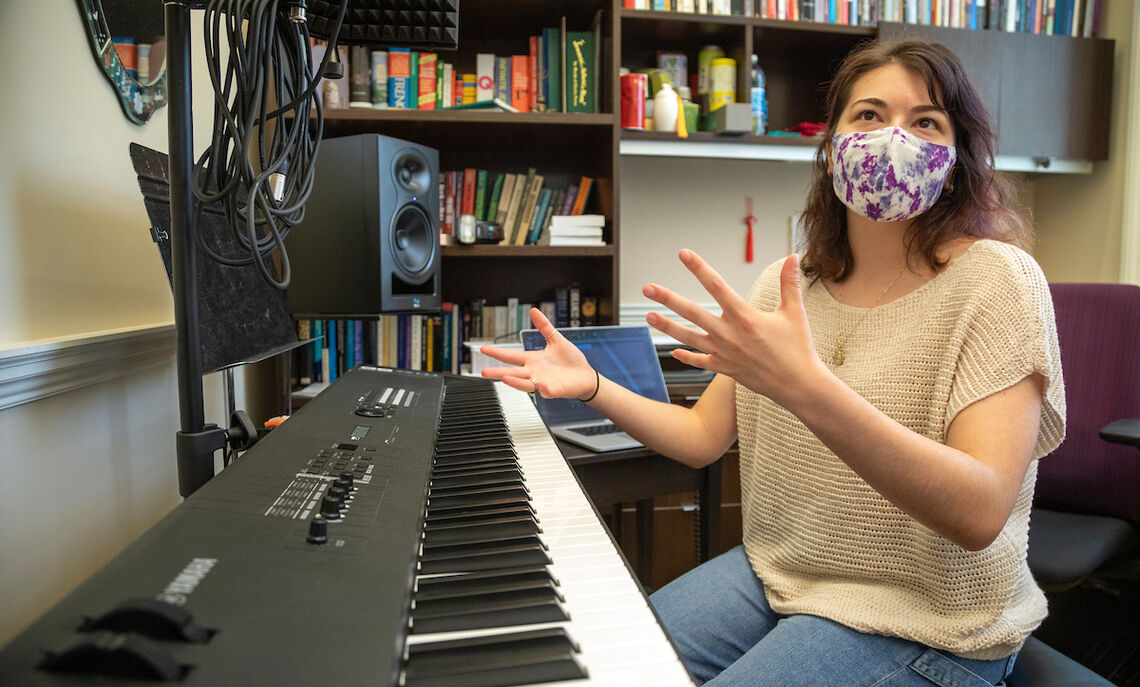F&M Stories
Research Fair: Student Samples Sounds With Synthesizers, Space
With electronic keyboards, synthesizers and computer software programs, Amanda Peterson explores electronic music and natural sounds to create her composing project.
"It's the intersection of the natural sounds you might hear with something that's not acoustic, but electronic," the Franklin & Marshall College Hackman Scholar said.
In her self-designed research encouraged by Matthew Butterfield, professor of music and Roschel College House don, Peterson used the research funds she received to purchase the electronic equipment and software she needed to compose and record her music.
"I wanted exposure to the technology and figuring out what kind of sounds I like and how to use those sounds," said Peterson, who plays the flute and piano.
As she sat at a Yamaha keyboard console in Butterfield's College House office, the senior English and music double major explained the purpose of her work.
"I was really interested in electronic music, basically anything that uses synthesizers, computers, things that could be made without an acoustic instrument," Peterson said. "I wanted to see how they play with space and time because synthesizers aren't real sounds."
Synthesizers imitate musical instruments, but can also be programmed to create sounds heard in nature and the real word, Butterfield said.
"With sound production technology, you can take sounds from the environment and transform them in some way—compressing them, filtering them—to defamiliarize them," Butterfield said. "In doing that, you offer a different perspective on those sounds and the spaces they're typically heard in."
To see how she could create different spaces, Peterson used samples of sounds from everyday life to see the interaction with electronic music.
"So I put together the sound of people walking with the synthesizer sounds," she said. "What kind of feeling or mood does that create? Is that something reminiscent of real life or does it take us out of reality?"
Butterfield explained that her composition is more layered then just those sound sources. "That's part of it, but also getting some drum loops and other kinds of sounds in there to enhance the texture of the environment. It's some really cool stuff that she's come up with," he said.
Peterson has several compositions that she continues to work on for honors consideration in the Department of Music and plans to become a music history professor. She was enlightened by the research and work composing and recording.
"It really changed how I listen to music as a whole because once you learn production software and the different effects and filters, you start to hear that in regular music whether it be electronic or pop music on the radio," she said. "It changes your understanding and appreciation of how much work actually goes into producing songs."
Related Articles
February 16, 2026
Powering Innovation: Inside F&M’s Campus Supercomputer
Imagine 1,600 computer processors combining power toward one task. This is the engine driving innovation at F&M. Called a High-Performance Computing (HPC) cluster, this elite shared resource accelerates discovery, empowers large-scale research, and fuels the collaborative spirit that defines the F&M experience.
February 12, 2026
Striking the Right Chord
Award-winning songwriter Bruce Sussman ’71 founded Franklin & Marshall’s first a cappella group on a whim in 1968. Alumni and current members reflect on the group’s origins and influence.
February 3, 2026
Coral, Caves and Ice Cores: The Path to Hydrology for Monica Arienzo ’08
Hydrology research has taken Monica Arienzo ’08 to coral reefs in the U.S. Virgin Islands, underwater caves in the Bahamas and ice cores in Antarctica and Greenland.

